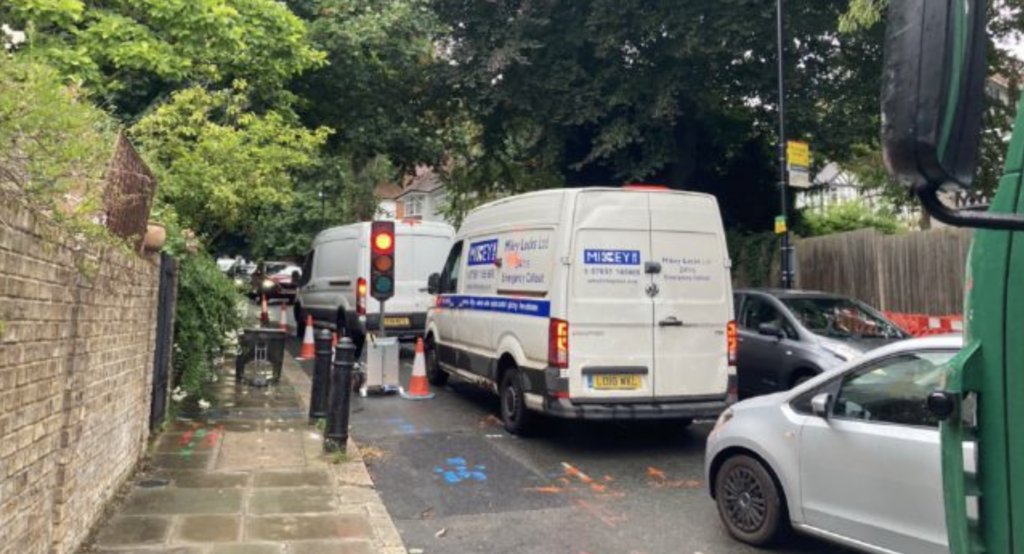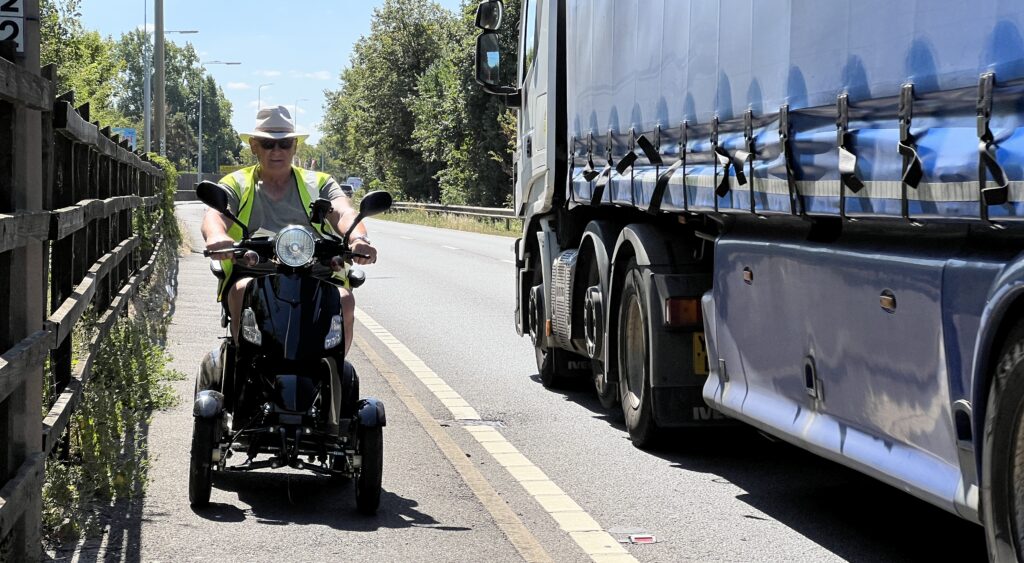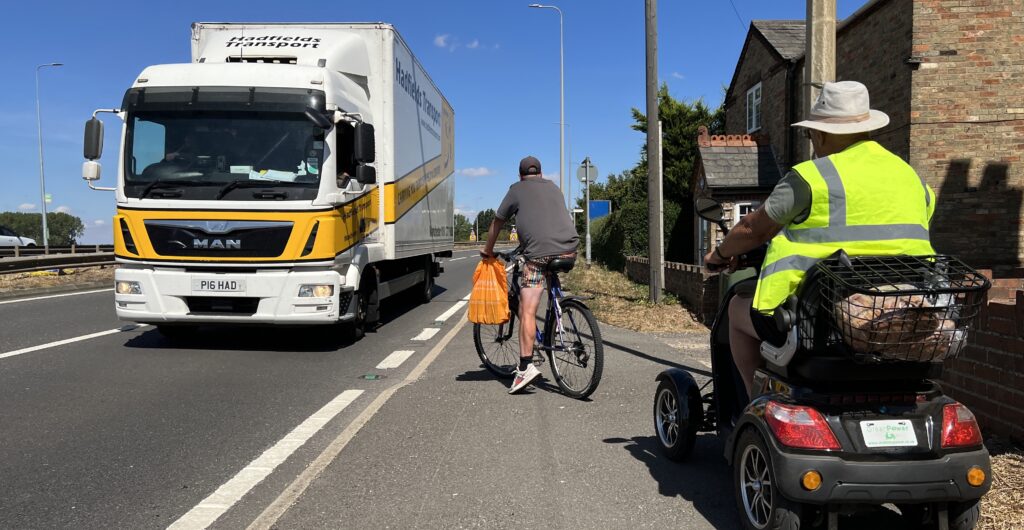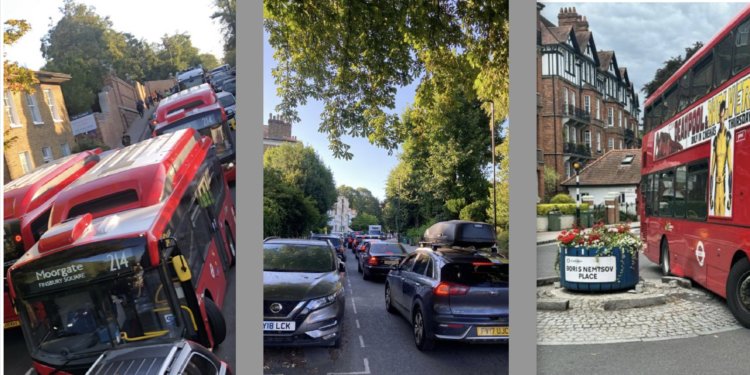The Labour-run London Borough of Camden (LBC) has been forced to scrap a hugely controversial Low Traffic Neighbourhood (LTN) scheme centred on Dartmouth Park on the eastern edge of Hampstead Heath – home to Ed Miliband, Benedict Cumberbatch and numerous other Labour luvvies. The plan had been to impose an 18-month ‘trial period’ with the least possible public consultation.
Attempting to put the best spin on it, LBC calls this a “pause”, but the scheme – a pet project of cycle-fanatic Cllr Adam Harrison, “Cabinet Member for Planning and a Sustainable Camden” and CBC’s Deputy Leader – was always unworkable. Uproar among locals, who discovered Camden’s brief ‘nonsultation’ was to be held during last summer’s holidays, was led by the Highgate Society which commissioned expert analysis of LBC’s dodgy metrics.
Locals packed protest meetings and deluged their council with complaints, not least about the scheme’s obvious potential for raising money by fines. With vehicle access from the north, east and south denied to thousands of homes in the LTN, voters demanded to know how ambulances, deliveries and visitors could reach them, or how anyone less than 100% fit would be able to get the shopping home?
Among many issues they highlighted were inevitable gridlock on Highgate Road, Highgate West Hill and other bus routes on the proposed LTN’s boundary, and increased air pollution on children’s walking routes to the area’s schools – ironically the same good schools which attract so many upwardly-mobile Labour supporters to leafy Dartmouth Park’s expensive homes.

Having wasted vast amounts of TfL’s money on consultants while plotting Dartmouth Park’s LTN in secret, Camden’s Labour regime has been handed an expensive lesson in not annoying one’s diehard voters. Its problems include a private company called Commonplace, and an unusually articulate local population.
Commonplace Digital Ltd is a privately-owned “citizen engagement platform” which claims to “inspire thriving places, powered by data and collaboration”. On its touchy-feely website rows of smiley, young and casually-dressed “customer success managers” and “business development managers” promote the platform.
What Commonplace actually does is to sell machine-readable online surveys to councils and developers – relieving them of the trudge of asking local people what they think and reading the responses properly, while still getting the result they first wanted via an ostensibly democratic process.
The snag, as we in Bedfordshire know to our cost, is in the questions asked and the boxes you’re allowed to tick. Our council’s Commonplace survey on local cycling and walking issues produced 826 responses, of which over 100 tried to explain – only possible in the “other comments” box – that by far our worst problem is how to get across the A1 safely into Biggleswade without using a car: a walk/cycle underpass is needed, obviously.


But in its published LCWIP plan, based on this “engagement”, Central Beds Council felt able to ignore the lethal risks run by locals trotting or wheeling their children across the A1 carriageways, because the online Commonplace survey had asked no machine-readable question about it. The metrics didn’t prove a need, which happily allowed CBC and National Highways to carry on ignoring the danger.
People are increasingly suspicious of the skewed questions asked in Commonplace surveys, and in the case of Camden’s proposed Dartmouth Park LTN, many refused to participate. Instead 773 locals emailed their council direct, as well as emailing individual councillors. Here in Beds our ward councillor just leafleted over 800 locals about our Biggleswade problem, asking what they need to get onto town safely, and the scores of replies were a revelation.
Ask people what they really think, without leading questions or tick-boxes, and what you get is ‘quote gold’. Many said roughly what was anticipated, though in their own inimitable words; others made important points that hadn’t even occurred to campaigners. Analysing genuine replies like these – as opposed to machine-readable surveys – takes time and thought, and Camden is now having to go back to the drawing board and read its hundreds of non-Commonplace responses, acutely aware that having wound up the Highgate Society and Dartmouth Park’s vigilant locals, its cunningly-worded online “consultation” cannot alone justify imposing a disastrous LTN.













To join in with the discussion please make a donation to The Daily Sceptic.
Profanity and abuse will be removed and may lead to a permanent ban.
Obvious innit
The virus goes home in the evening. A shower, evening meal and a good nights sleep before out and about the next day
Am I the only one who knew this?
It seems people have been standing up at home, when they should have been sitting down.
“In other words, the shit in the timing of night curfew had – at best – a marginal impact on mobility.“
Might want to correct that typo…
Interesting piece, thanks, anyway.
Thanks.
I think it was a Freudian correction
“ This finding suggests that governments should focus on protecting care homes and hospitals, rather than trying to control the epidemic by tweaking people’s shopping habits.”
Yes, IF governments wanted to control the epidemic. But their aim is to control people’s minds. So tweaking shopping habits is a spot-on strategy. Keep it random, keep it complicated and keep the fear.
“They’ve got the F.E.A.R.”
“As more people were present simultaneously in high-risk places such as supermarkets, the early curfew backfired”.
“Backfired” is a very generous interpretation considering all the other barrage of lies we get.
Well, whodathunkit!
People need to realise that the most important factor in infection is the acquisition of a sufficiently high viral load to beat your body defences. Casual, transient contact does not transmit sufficient to be dangerous to all but the weakest immune system, lack of symptons means that even with the virus they are not shedding large quantities of virus. The places where you run a risk are where you spend a long period in contact with others – homes, care homes and hospitals.
Perfect. I concur, transmission was of minor importance out in the ambulatory community. All fear & fraud.
Finally, a scientific study shows us how to get the BBC to cover anti-lockdown protests.
Attack the BBC reporter who’s there to report on any violence. Then he can do his job AND make it all about him. Added bonus – you’ll get “Boris” and “what does her prettiness have to do with it, you sexist oaf” Patel involved too. Sadly, there’ll still be no reporting of the actual anti-lockdown protest as such.
All you get is the message that anti-lockdown protestors are violent, nasty people, based on the actions of a handful who are not even verified as true supporters and may have been deliberately place by opponents to discredit the protest.
PS Who believes this man had gone out to film it. Where is the film crew and sound people. The only footage I saw was from a phone, maybe, just maybe, held by another agent provocateur.
This is just evil
https://medicalxpress.com/news/2021-06-covid-vaccines-safety-strong-immunity.html
A group of scientists led by researchers at the University of North Carolina at Chapel Hill, Weill Cornell Medicine and NewYork-Presbyterian reported that the Moderna mRNA vaccine and a protein-based vaccine candidate elicited durable neutralizing antibody responses to SARS-CoV-2 in pre-clinical research. There were no adverse effects.
The research, published June 15 in Science Immunology, suggests that vaccines for young children are likely important, safe tools to curtail the pandemic.
Evil indeed.
Politicians around the world are trying all methods to control people (not covid), regardless of how ridiculous they are.
The control is required so as to ensure that the genocide runs smoothly.
“Ooh! A passport! Are we going somewhere?”
“Don’t worry about your washbag. We’ve everything you’re going to need”
Pretty obvious. And it’s pretty obvious that this happened when we shut down “non essential” retail here in the UK. All those shops that had a wide range of products became very busy – I’m thinking here of The Range, which I popped into to get some PVA glue, it was rammed. They stayed open because they sold “essential” items too – food and DIY – but most people were just there for something to do.
If smaller craft, book, clothing shops had been open people would have been more spread out, leading to less transmission.
6pm curfew? Who’d have thought the Greeks would make our bunch look like libertarians?
When will the penny drop for governments all over the world, that lockdowns don’t work? When will they look at the evidence, sorry, DATA, from Texas, Florida, South Dakota, etc. proving the point? Or maybe they DO know, but keep using futile tactics to keep us oppressed?